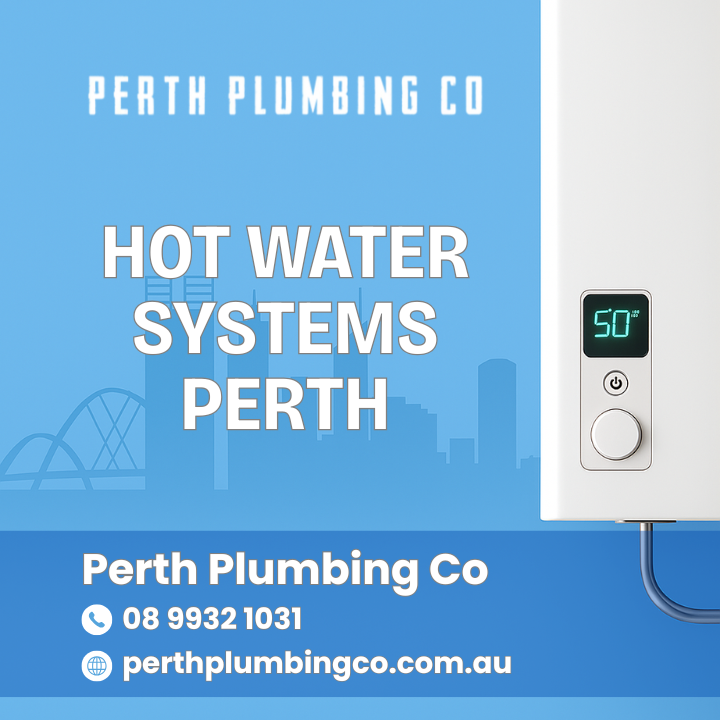See our 100+ 4.9 Star reviews on Google

Perth hot water systems
If you are in need of a new hot water system, or if your current system needs repair or maintenance, then you should definitely contact Perth Plumbing Co Design. We are the best hot water system services provider in all of Perth, and we can definitely help you out with whatever you need.
Hot water systems are an essential part of any home or business, and they need to be properly cared for in order to function properly. That's where we come in. We have years of experience in dealing with hot water systems, and we can help you with anything you need, whether it's a new installation, repair, or maintenance.
At Perth Plumbing Co Design, we always put our customers first, and we will work with you to ensure that you are completely satisfied with our services. We know that hot water systems can be a big investment, and we want to make sure that you are getting the best possible service for your money.
Book a plumber/quote




Hot water system installation services
When it comes to hot water system installation in Perth, there is no better company to trust than Perth Plumbing Co Design. We have been providing top-quality plumbing services to the people of Perth for many years, and our hot water system installation services are second to none. We understand that when your hot water system goes out, it can be a major inconvenience, and that is why we work quickly and efficiently to get your system up and running again as soon as possible.
Perth Plumbing Co Design offers a wide range of hot water system installation services to meet your specific needs. Whether you need a new system installed from scratch, or you need an existing system repaired or replaced, we can help.
When you call Perth Plumbing Co Design for hot water system installation, you can rest assured that you are getting the best possible service. We use only the highest quality materials and products, and our team of experienced and certified plumbers are dedicated to providing you with the best possible service. We will work with you to determine the best type of system for your home or business, and we will install it quickly and correctly.

Hot water system Perth
Solar hot water system Perth
Hot water systems Perth
Gas hot water system Perth
Hot water system repairs Perth
Electric hot water systems Perth
Solar hot water systems Perth
Electric hot water system Perth
Hot water system replacement Perth
Hot water repairs Perth
Hot water system installation Perth
Gas hot water systems Perth
Heat pump hot water systems Perth
Perth hot water system replacement
Heat pump hot water system Perth
Solar hot water system repairs Perth
Instant electric hot water system Perth
Instant gas hot water system Perth
Best hot water system Perth
Hot water system repair Perth
Instant hot water system Perth
Hot water system service Perth
Gas storage hot water system Perth
Electric instant hot water system Perth
Hot water heater repair Perth
Hot water repair Perth
Rheem hot water systems Perth
Rheem hot water system Perth
Hot water system
Solar hot water system
Hot water systems
Gas hot water system
Hot water system repairs
Electric hot water systems
Solar hot water systems
Electric hot water system
Hot water system replacement
Hot water repairs
Hot water system installation
Gas hot water systems
Heat pump hot water systems
Hot water system replacement
Heat pump hot water system
Solar hot water system repairs
Instant electric hot water system
Instant gas hot water system
Best hot water system
Hot water system repair
Instant hot water system
Hot water system service
Gas storage hot water system
Electric instant hot water system
Hot water heater repair
Hot water repair
Rheem hot water systems
Rheem hot water system
For the best in plumbing and gas
If you’re looking for a local plumber Perth-wide, then you’ve come to the right place. We pride ourselves on our quality workmanship and friendly service on every gas and plumbing job we undertake. We’re always here to help, so if you have any plumbing or gas-fitting needs, don’t hesitate to give us a call.
Hot water system repair services
Your hot water system is an important part of your home, and you use it every day. That’s why it’s so important to make sure it is running properly. If you notice any problems with your system, such as leaks, strange noises, or a decrease in water pressure, you should call us right away. We will come out to your home and assess the situation, and we will let you know what needs to be done to fix the problem.
At Perth Plumbing Co Design, we offer the best hot water system repair services in Perth, and we can help you get your system back up and running in no time. We have years of experience working with all types of hot water systems, and we can help you troubleshoot any problems you may be having. We will also give you advice on how to maintain your system so that it stays in good working order.
Hot water system maintenance services
When it comes to your home’s hot water system, you can’t afford to take any chances. That’s why it’s so important to find a company that offers the best hot water system maintenance services in Perth. At Perth Plumbing Co Design, we have a team of experienced and qualified plumbers who can take care of all your hot water system maintenance needs. We understand that your hot water system is a vital part of your home, and we’ll do everything we can to make sure it’s running smoothly and efficiently.

Contact us
Our team is ready to assist you!
